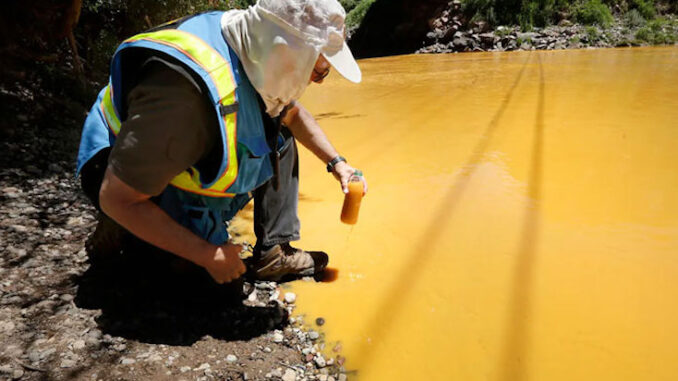
An explosive new study has revealed that tens of millions of Americans have been exposed to toxic waste as a result of the WEF’s push to transition to so-called “green energy.”
23 million people are now exposed to toxic water runoff from metal mining.

BYPASS THE CENSORS
Sign up to get unfiltered news delivered straight to your inbox.
You can unsubscribe any time. By subscribing you agree to our Terms of Use
Latest Video
The report highlights the devastating impacts of the rush to transition to “green” energy.
The demand for mining for minerals needed for electric-powered car batteries has polluted 500,000km of rivers and destroyed over 16 million acres of farmland.
Slaynews.com reports: The researchers found that 23 million people worldwide, as well as 5.72 million in livestock, over 16 million acres of irrigated farmland, and over 297,800 miles worth of rivers, have been contaminated by mining’s toxic byproducts seeping into the water.
This metal mining includes many so-called “rare earth elements” essential to the manufacture of high-tech solar cells, wind turbines, and the batteries needed to store sustainable “green” energy.
While the new study focuses on environmental impacts, global metals mining has recently faced shocking lawsuits against major tech firms, including Apple, Google, Microsoft, and Tesla.
The companies have been accused of supporting child slavery in the Congo, where 70 percent of the industry’s cobalt is sourced.
“Rapid growth in global metal mining is crucial if the world is to make the transition to green energy,” noted Chris Thomas, a zoologist at the University of Lincoln whose specialty is in spatial ecology and threats to the global water supply.
Thomas led the analysis and modeling work for the new study, which was published today in Science.
Thomas and his colleagues have developed a new database, supported by on-the-ground testing, which now maps the hundreds of square miles’ worth of rivers and floodplains contaminated by these industrial processes across the globe.
The devastation wrought by this contamination, they found, was widespread, affecting approximately 297,800 miles (479,200 km) of river systems total and over 63,000 square miles (164,000 sq-km) of floodplains worldwide.
But, North America stands out as the most affected.
The United States and Canada have 123,280 miles of tainted river systems and approximately 10.7 million acres of polluted floodplains.
But the damage was not much better in South America with 50,766 miles of rivers and over 9.5 million acres of floodplain impacted.
In Asia, the continent has about 37,842 river miles and about 8.3 million acres of floodplain polluted by metal mining waste.
Mark Macklin, director of the university’s Lincoln Centre for Water and Planetary Health, who led the international team behind the new research, said he anticipates the new study’s maps and modeling tools will help prevent future reckless mining.
“We expect that this will make it easier to mitigate the environmental effects of historical and present mining,” Macklin said.
“Our new method for predicting the dispersal of mine waste in river systems provides governments, environmental regulators, the mining industry, and local communities with a tool that, for the first time, will enable them to assess the offsite and downstream impacts of mining on ecosystem and human health.”
Concerns over just how bad the ecological impact of metal mining for sustainable technology might be are complicated by the diverse variety of resources involved, which can lead to “apples to oranges” comparisons.
According to the MIT Environmental Solutions Initiative, green energy technologies like wind turbines and electric cars often do require many more mined minerals than the present fossil fuels infrastructure.
One electric car, for example, requires six times more metallic and mineral materials than a combustion engine car, MIT’s university team reports.
A wind power plant, meanwhile, requires nine times more of these mined compounds than a traditional gas-fired plant.


